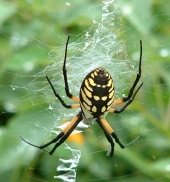
 5
5




 1
1




[img]http://i109.photobucket.com/albums/n52/havlik1/permie%20pics2/permiepotrait3pdd.jpg[/img]
"One cannot help an involuntary process. The point is not to disturb it. - Dr. Michel Odent




 2
2




 2
2












[img]http://i109.photobucket.com/albums/n52/havlik1/permie%20pics2/permiepotrait3pdd.jpg[/img]
"One cannot help an involuntary process. The point is not to disturb it. - Dr. Michel Odent
 2
2








SueinWA wrote:
Natural farmer Joel Salatin rotates his cattle from one pasture to another every few days, and then runs free-range chickens behind them. The chickens scratch through the manure the cows left behind, scattering it around and eating all the insect larvae they can find (including fly maggots). Not only does this help keep the fly population down, but it helps break up the parasite cycle in the cattle.
If you aren't familiar with Joel Salatin's farming books, you should check into them. http://www.polyfacefarms.com/books.aspx
You Can Farm
Salad Bar Beef
Pasture Poultry Profits
Everything I Want to Do is Illegal
Holy Cows and Hog Heaven
Family Friendly Farming
Sue
Laughter is the best medicine.
http://www.lawntimes.com




 2
2




[img]http://i109.photobucket.com/albums/n52/havlik1/permie%20pics2/permiepotrait3pdd.jpg[/img]
"One cannot help an involuntary process. The point is not to disturb it. - Dr. Michel Odent








Leah Sattler wrote:
I have always wondered about those. Do think there would be some way to establish a population so that you wouldn't have to keep buying them?
Laughter is the best medicine.
http://www.lawntimes.com








 4
4




 5
5




$10.00 is a donation. $1,000 is an investment, $1,000,000 is a purchase.
 6
6




Whoah!! Check out this permie deal!! https://permies.com/w/homesteading-bundle?f=232
"The only thing...more expensive than education is ignorance."~Ben Franklin. "We can easily forgive a child who is afraid of the dark; the real tragedy of life is when men are afraid of the light." ~ Plato
 3
3




 4
4





|
The glass is neither half full or half empty. It is too big. But this tiny ad is just right:
permaculture thorns, A Book About Trying to Build Permaculture Community - draft eBook
https://permies.com/wiki/123760/permaculture-thorns-Book-Build-Permaculture
|






